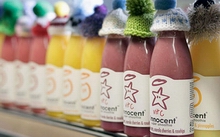 Coca-Cola is taking full control of Innocent smoothies in a deal that will make millions of pounds for the company's founders.
Coca-Cola is taking full control of Innocent smoothies in a deal that will make millions of pounds for the company's founders.Coke, which first bought an 18% stake in the company in 2009, refused to disclose the terms of the deal but is likely to have paid substantially more than the £76m it paid for a further 38% in 2010.
The deal, which is subject to competition approval, will take Coke's stake above 90%, with the three founders retaining an undisclosed "small, but significant stake".
Richard Reed, one of three Cambridge University graduates who founded Innocent at the age of 26 in 1999, denied they were selling out. "Our aim was to make Innocent a global brand and take its ethical values to the world's consumers. We decided that we would be able to do a better job of that with Coke."
Reed said the relationship with Coke had been "beautiful" because the founders had been able to run the company but take advantage of Coke's marketing and buying power. "Because of Coke we were the official smoothie of the Olympics and our drinks were sold all over the park – and we got loads of tickets for the beach volleyball," he said.
Reed said he and the other founders – Adam Balon and Jon Wright – will continue to advise Innocent and serve on the company's executive committee. "But we're not going to be the guys that make the ultimate decisions any more."
He said Innocent would be run by the smoothie company's current management team from its Fruit Towers headquarters in west London.
Reed also assured customers that Coke was committed to Innocent's ethical ideals, and its promise to give 10% of profits to charity. He said Innocent will give more than £2m to charity this year, mostly to the Innocent Foundation that supports farming NGOs in developing countries.
Reed said he hadn't decided what he'll spend his personal windfall on beyond a nice summer holiday and "helping my two sisters with somewhere to live".
"We've worked hard for 15 years this is one of the benefits of it," he said. "We're not just going to take the money and go sit on the beach, although there's definitely enough to do that."
Reed said he and the other founders have also set up a fund to help other young British entrepreneurs. The Jam Jar fund has already invested in a 24-year-old woman's "funky sportswear" business after all the main high street banks rejected her business plan.







